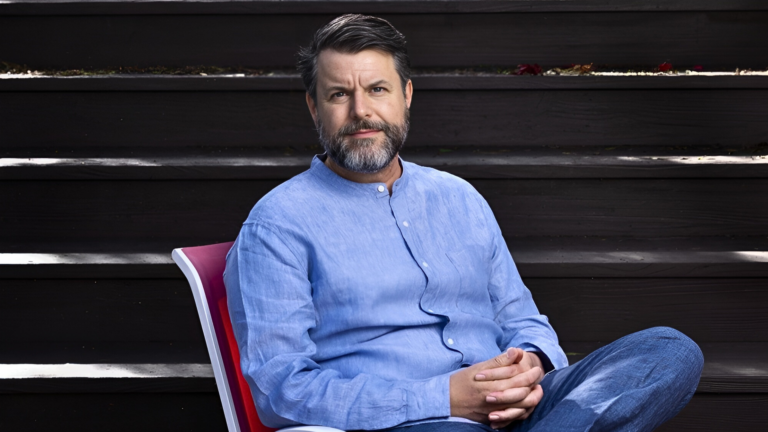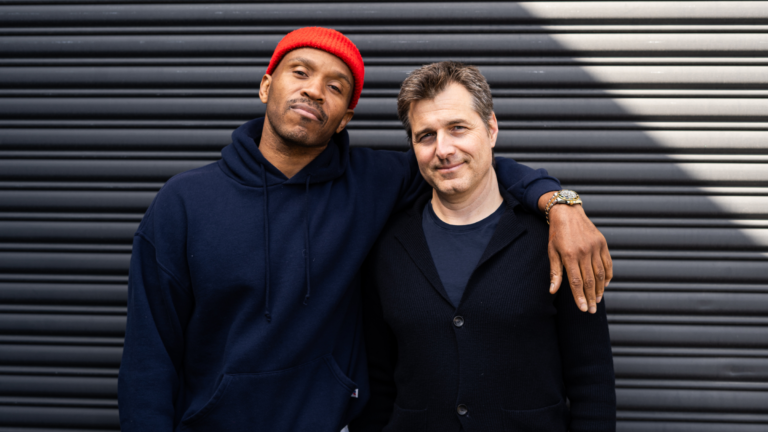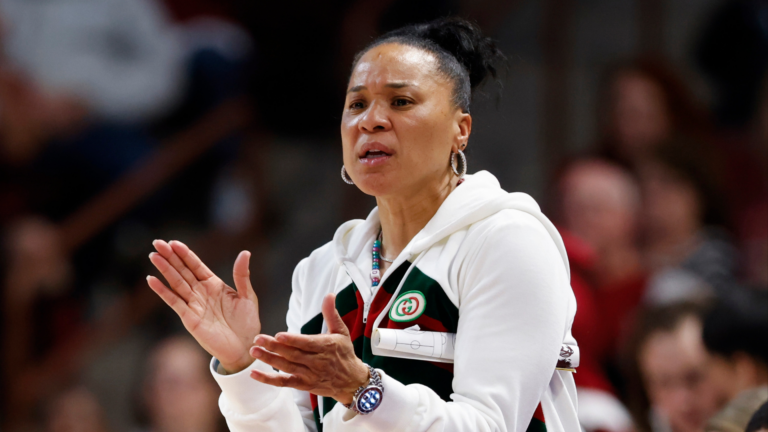This week’s conversation is with Owen Eastwood, a Performance Coach engaged by high profile teams around the world hunting for a competitive advantage through their culture.
He currently works with the British Olympic and English football teams and has previously worked with diverse teams such as the Command Group of NATO, the South African cricket team, corporate leadership teams and in elite ballet.
Owen’s a New Zealander with a unique approach based on an evolutionary understanding of what makes teams of humans strong and weak.
There are some incredible insights and some wonderful ancient wisdoms that we have stopped listening to and Owen’s mission is to re-introduce people to those ideas.
He introduced me to a concept I love called “Whakapapa” – something the famous New Zealand men’s national rugby union team, commonly known as the All Blacks, has built their culture around.
Essentially the shirt is more important than any individual.
You wear the shirt with a sense of pride and a sense of duty.
And then you pass it on, along with the stories, the values, the rituals and tradition, to those who come after you– and that’s something we dive into in this conversation.
“My job is really quite simple, it’s trying to help leaders create the optimal environment for their people to thrive in, and achieve the mission that they share and this is as simple as that.”
In This Episode:
How does he describe himself
I’ll call myself a performance coach and my particular focus is around building team culture and leading that culture. So I don’t like to tell people what to do, I like to coach them.
What makes him different than other coaches?
Once I started to get some exposure to these high-performing environments, what I came to realize very quickly is that some of the spiritual ideas that I’ve been carrying with me most of my life and some of the ancient wisdom that had really resonated with me, seemed to be perfectly applicable to what these people are trying to do. So I started to introduce them into the conversations and started telling stories and using them as reference points.
His mission
My job is really quite simple, it’s trying to help leaders create the optimal environment for their people to thrive in, and achieve the mission that they share and this is as simple as that. What is the best environment we can possibly create to get the best out of everyone here and achieve our mission. And Sometimes people are so busy and say swamped with data and strategy and tactics and everything that actually sometimes they don’t make time to reflect and consider that, so that’s where I would step in.
How does he help develop ideal culture?
It starts with belonging. And we needing to understand that we have this not only a psychological but biological need to belong. Once we have a sense of belonging, our anxiety levels start to come down and our dopamine levels, oxytocin levels, you know this stuff better than me, Michael, they become imbalance and we get into this optimal state where we can go and compete from. So belonging is somewhere where we start from. For me, a critical factor of high-performing teams is this idea of a vision and they visualize it as deeply as an individual visualizes their own performance.
Having a shared vision
It’s got to be done and curated very carefully. And that is what aligns everybody, that’s what everyone signs up for and that’s what paves the way for success. I still find it quite incredible that a lot of elite teams or still not 100% clear on what they’re trying to do. They know they want to win, but the actual depth and richness of the vision isn’t there.
The brutal reality of his work
There’s only going to be one winner of a world cup. Or one winner of the NFL. And one Olympic gold medalist. And so a lot of my work is not just preparing people to be successful, it’s also helping them overcome the pain and suffering of not achieving their dreams and being disappointed. And I suppose the more I do this work, maybe I regard that as actually more important, I’ve spoken with athletes who have spoken to me, and then I’ve got them to talk to the team about what it feels like when they are suffering and not achieving their goals and their dreams.
How does he help people move through disappointing outcomes?
The most important thing to me is that we go through the experience of joy or disappointment together. And the thing that will break my heart and make me look at myself and think I have failed is that, if either of those scenarios play out and we become a bunch of individuals. And we either become heroes and look at ourselves as some form of celebrity because we’re successful or alternatively, we splinter apart and go and suffer alone either of those situations.
His cherished framework
My own ancestors, the Maori people have this spiritual idea called whakapapa. This beautiful idea is that each of us, a part of an unbreakable chain of people back to our very first ancestor. And we’re literally, our arms are interlinked, but it’s not only back to our first ancestor. We’re part of this chain of people into the future to the end of time. And the metaphor we sort of use is that the sun first Shone on our Genesis story, our ancestors, the first vision of this team, this nation, the school, whatever it is, they’re family. And the sun has slowly moved down this chain of people from our first ancestor, just slowly moves down this chain of people. And when the sun moves off a person, that means their time has gone. But what is critical in our tribe is that they pass on to us, our sense of identity, a sense of purpose, a vision of what we’re trying to do together and our values and rituals and traditions. And that is why we are an unbreakable tribe. And the sun keeps moving. And whatever you achieve when the sun is shining on you, that is your legacy. That is the memory that people will hold of you when you’re dead. And the sun keeps moving. So right now my friend, the sun is shining on you and I, and our families, the sun moved off my father, but me and him our arms have this link, which is unbreakable. And the sun will move from me and you of course as well. And that’s fine because I’m immortal. Because I’m part of this tribe, which will never end. And so what is critical is that this gives us an incredible sense of belonging.
Whakapapa and the All Blacks
The All Blacks, they use the language of Whakapapa. And they, more importantly is the backbone to their culture. That’s what players and coaches tell me. So they have this incredible idea that the team started in 1893. In 1905 the team was called the originals. They were particularly special team that the team resonate with. And what has happened is that the shirt has been passed down all of those players and generations, what those teams achieved when the sun was shining on them is forever carved into the walls. Some of the teams worn world cup, some of the teams went overseas for months and months and were unbeaten. Some of the teams failed. Some of the teams broke down. Some of the teams, selfishness crept in and took away the collective mission. With that, just a group of human beings, Like all of us they’re flawed, they’re not perfect. But they have been able to sustain incredible success for a long period of time. And the backbone of that team culture, the way it’s been described to me.
The shirt is more important
What I’ve seen is, this idea of whakapapa because the shirt is more important than any individual. The shirt must be passed down and with the shirt, the stories and the values and the rituals and tradition, and you wear it with pride and a sense of duty. And then you pass it on to those who come after you. And it is not all about you. It’s not all about how much money you can make and how much Liberty you can make for yourself. It is always about the tribe. It’s always about the team. So these ideas are not just spiritual ideas. They are actually applied. That’s a big motivation for writing a book, because a lot of these really beautiful, powerful ideas are applied in real life.
Environment matters
I’ve heard an insight that 70% of behavior is determined by whatever environment you happen to be in at any point in time. And that rings so true to me. You can have an outstanding performer in any field with an amazing mindset, wonderful, sharp mental skills. And you put them in an environment which is low trust, high anxiety, chaotic, lack of clarity, people motivated by status, shuffling those types of things going on. They’re not going to be a world-class performer Generally. They can’t deliver their talent to the maximum in that type of environment.
What happens when people feel as if they belong?
When people feel a sense of belonging, they lock into the task, they lock into their role. They lock into the people around them. They’ve got this sort of purity, which allows them to live in the moment. And when people don’t feel belonging and when they feel anxious. And as you say, when there’s adrenaline pumping around the system, they become very distracted. They’re very concerned with the micro signaling of the people, around them, particularly the leader, but also other people. They start leaking energy. They shut down a bit because they want to stay in the shadows so that they might not be exposed. They know they prevent vulnerability. They do not want to be someone who puts their hand up and says, I didn’t understand it exactly what you just described there, what you want me to do. They lose opportunities to learn and develop. And the reason they do that as own self preservation mode, is that they don’t feel the trust, the belonging in order to be vulnerable.
What surprised him about the most integral part of a strong culture?
I think when I started out, I was probably a bit obsessed with the leader as they were the key gate keeper to all of this. But now I do a lot of work with senior players and captains. Because actually they are the ones who have an incredible influence on the performance, the athletes. Because our peers have such a fundamental impact on our mindset and our outlook and our sense of belonging and our level of trust. So whatever the leader is saying in terms of the organization and the coach and the captain, if it’s not replicated down amongst peers, then it’ll be significantly undermined. So if someone can say you belong here. This is a special tribe that you’re part of, but actually, if you were hearing day-to-day things from the guys at your own level, particularly if you’re a rookie or whatever coming in, let’s say actually this is not the type of place it is… Then you are going to have back into high anxiety mode, don’t you.
How leadership has changed for the worse
Our need to belong, I think this is something that’s critically important, is that for all of our history I would say, including now, if you are alone, you won’t survive. Your health will be seriously compromised for most of our history that would have been fatal. And so that need to belong. That survival instinct that we all have, that was part of a band of people and the band had a leader. So the leader’s fundamental job was to take care of people. That was a fundamental job. That’s why our groups of humans existed. So when we think of it like that, why is that not obvious to us today? Why do we feel that we can go and pursuit of outcomes and sacrifice people and damage people along the way? It makes no sense to me.
How he thinks about true leadership
True leadership to me starts with the idea that we have come together. To make sure that we take care of everybody. And we are in pursuit of a mission to give it, no doubt about that, for the wellbeing of our tribe. But along the way, we will take care of everyone and we don’t damage people or sacrifice people on the way.
What about when an outcome like winning is necessary?
We talked about Whakapapa, when we talked about the sun shining on us. And when we come into a specific team that is set up to pursue a specific purpose we understand that it is conditional on performing, and therefore the sun might not be on us for very long, or it might be on us for 12 years. We don’t know. Time will tell what’s important is that when the sun is on us, is that we are full in. We are part of this team. We feel belonging and we can trust those people around us. And that is the environment that is being created. But we fully understand that we have been put together for a purpose, and if our performance isn’t good enough, then I’ll tell him we’ll move on. So there’s no contradiction there.
The right way to treat people
When I’m talking about leaders taking care of people, I’m not saying, “okay, you’re not performing very well, but I don’t want to hurt your feelings, so you’re staying and I won’t drop you, or we’re giving you a contract.” I’m not talking about that, I’m talking about some basic humanity about how we treat people. And if they aren’t good enough, then that’s okay and we’ll do it in a way which actually makes this experience one, which enhances their life and becomes a springboard to something rather than the end of it.
His mission
There are some incredible insights and some wonderful ancient wisdom that is wrapped up in some beautiful stories and spiritual ideas that we have stopped listening to. And that’s actually what I want to do, is to re-introduce people to those ancient ideas, and to bring in as much insight from a scientific point of view as possible.
How does he describe mastery
I think mastery for me has a light side and a dark side. On the light side, it’s about growth. It’s about getting a deep understanding and really sharpening your tools in an area. For me, it’s really, really important that that benefits a tribe. To me, it’s not an individualistic thing so much as how this will help others. That’s the culture I come from. I think the other side though, is that sometimes mastery people associated with imposing themselves, it’s become synonymous with power and influence over people. So I master others, I master a situation. And for me, that’s not the optimal environment when we feel we are trying to dominate. I think the great environments that I’ve certainly seen are ones where the growth, the mastery is enabled because people are given a freedom to express themselves and freedom to be vulnerable, freedom to take risks.
The beauty of Maori culture
Maori culture, there’s two very powerful ideas in this space. One is Tapu. T-A-P-U, which sort of translates as sacred, prescribed, non-negotiable. And the other concept is Noa. Which is freedom to express. And for me, those environments certainly that I try and help create, are ones where there’s a balance between Tapu and Noa. Is a balance between what is sacred, which really become our boundaries. But within those boundaries, there is plenty of Noa. There’s plenty of opportunity for you to express yourself, go off and learn, be vulnerable as I say, take risks, make mistakes. And so for me, mastery is massively influenced by your environment. And again, going back to our ancestors wisdom, I think those ideas of Tapu and Noa, which a millennia old, I think they still work today.


